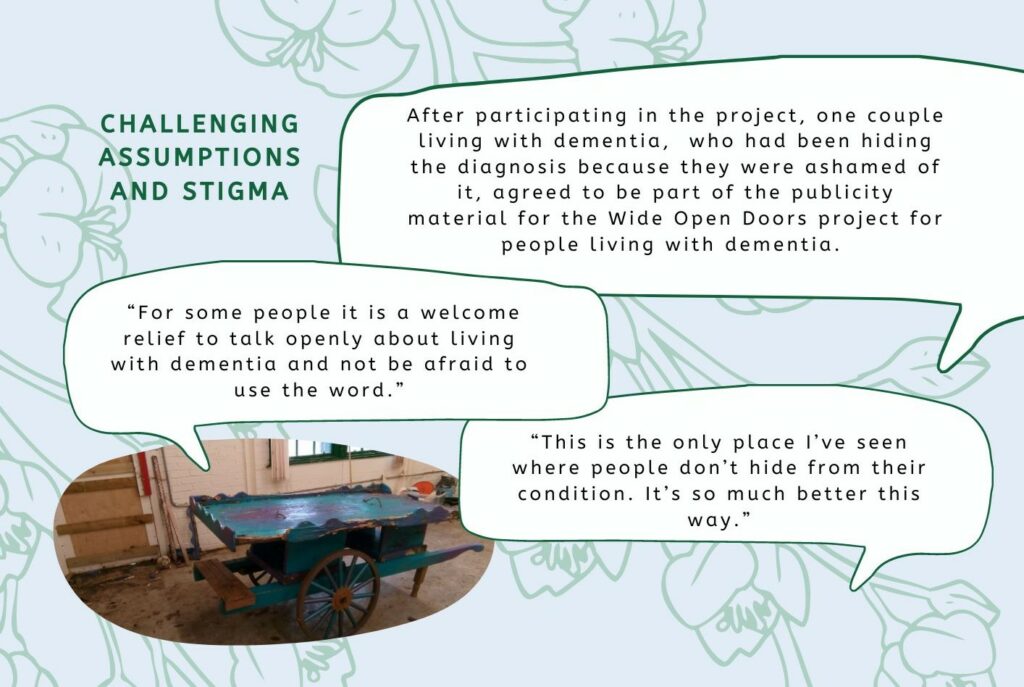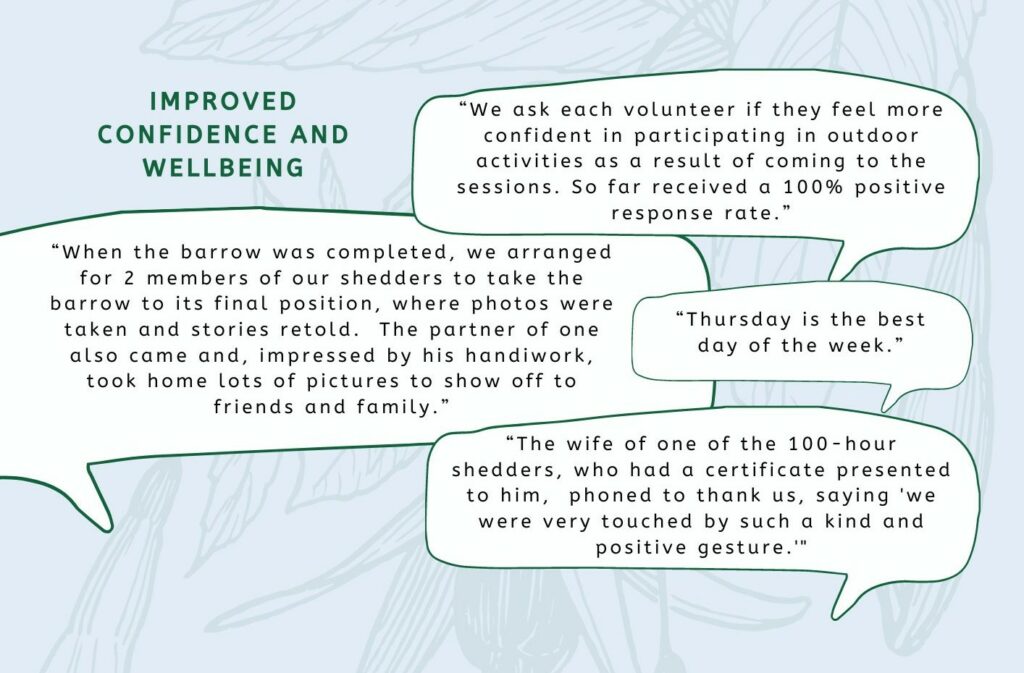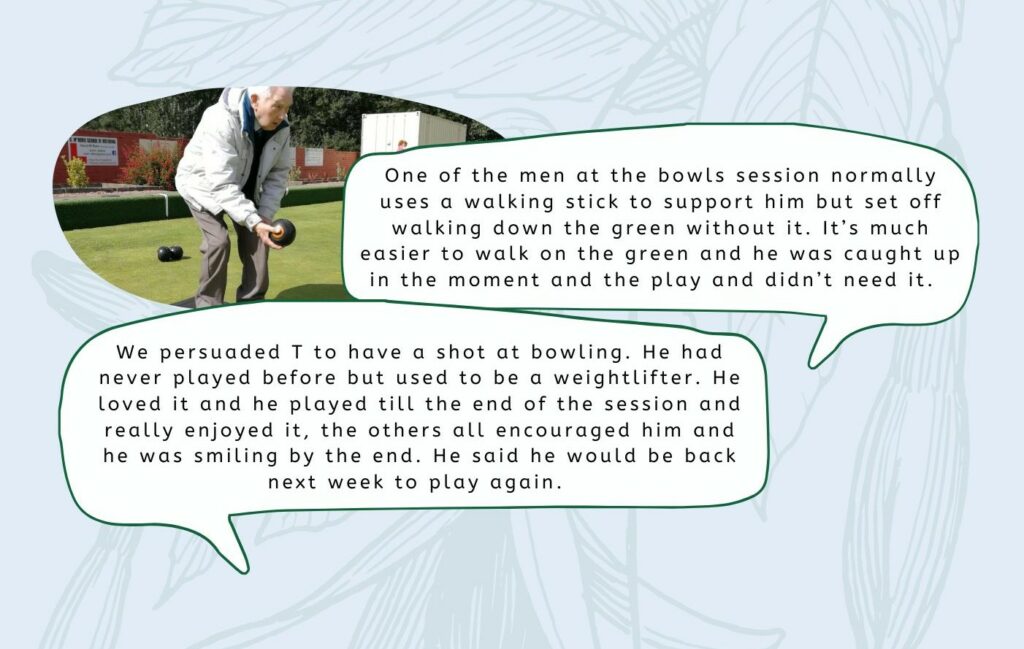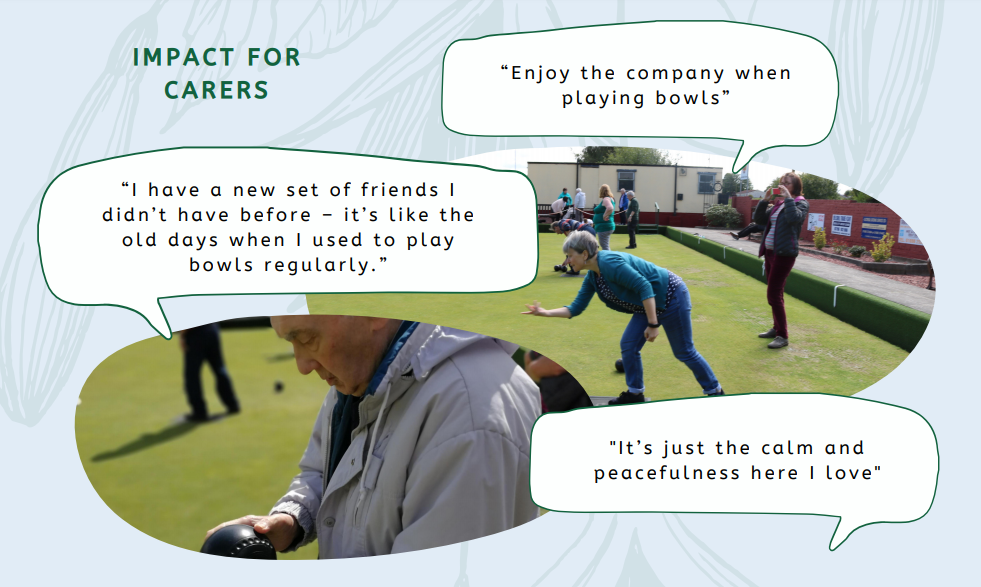Using Magic Moments
Evaluating inclusive outdoor activities
We have recently completed an evaluation for Life Changes Trust of the six ‘Get Outdoors’ projects they have funded. The Get Outdoors projects have different focuses – from tool sheds to wildlife conservation to sports. But they all encourage people living with dementia and their unpaid carers to be more active and spend time outside.
We took a different approach to the evaluation, gathering key moments or ‘magic moments’ from the people participating, volunteering and working in the projects.
We did this for two reasons, because we were working with projects and activities that were taking place outside, in a variety of locations, such as bowling greens, allotments and community woods.
And also because the people living with dementia and their carers participating were busy doing activities or out walking. We didn’t want to get in the way, take people away from what they were doing, or bring them inside. If we used traditional evaluation methods, we would have missed the real action outdoors. A wonderful aspect of the projects was informality – the relaxed, friendly atmosphere. It was important to make the evaluation process as enjoyable and barrier-free to take part in as possible.
Taking part and experiencing magic moments together
So the approach we took was to visit the projects and take part in activities, if the group were happy with us doing that. We also watched what was going on and had lots of conversations with people, chatting about what was going on, how people felt, what they liked and enjoyed and the difference it made.
Because we didn’t used a closed format, there was plenty of space for all the other things people wanted to talk about. Like what was going on, the things people could see whilst we were walking, and the memories it prompted. For example, the Sporting Memories activities we evaluated are great at prompting reminiscence about sports (as well as giving everyone a chance to play different sports). So it wouldn’t make any sense to interrupt a group member’s rich, insightful story to focus on narrow interview questions!
Our observations from taking part, the photos and videos, and the conversations were gathered into Magic Moments. The moments were based around significant changes and impacts that people identified. The moments were often small but they are significant for individuals, families, volunteers and workers. We then used all the magic moments to assess the overall impact of people spending time outside.
Why Magic Moments make a difference
The magic moments collected gave us a richness and insight into the benefits of spending time outside for people living with dementia and their carers that we could never have gained from more usual methods.
It was clear spending time outside had real benefits for people living with dementia and their carers – and the Magic Moments show how this happens. The Magic Moments show different themes – like removing stigma, and increased physical ability – but most importantly they show how these were felt, interpreted and experienced by the people involved.
We think this has benefits, especially for community-based evaluations. When what really matters is equality, inclusion and wellbeing, numbers and surveys can’t always express the complex, dynamic ways these happen.
Here are a few magic moments from the Get Outdoors evaluation.
The Ecology Centre

Challenging assumptions and stigma
“After participating in the project, one couple living with dementia, who had been hiding the diagnosis because they were ashamed of it, agreed to be part of the publicity material for the Wide Open Doors project for people living with dementia.”
“For some people it is a welcome relief to talk openly about living with dementia and not be afraid to use the word.”
“This is the only place I’ve seen where people don’t hide from their condition. It’s so much better this way.”

Improved confidence and wellbeing
“We ask each volunteer if they feel more confident in participating in outdoor activities as a result of coming to the sessions. So far received a 100% positive response rate.”
“When the barrow was completed, we arranged for 2 of our shed members to take the barrow to its final position, where photos were taken and stories retold. The partner of one also came and, impressed by his handiwork, took home lots of pictures to show off to friends and family.”
“The wide of one of the 100-hour shed members, who has a certificate presented to him, phoned to thank us, saying ‘we were very touched by such a kind and positive gesture.'”
Sporting Memories
Enjoying physical activity

“One of the men at the bowls season normally uses a walking stick to support him but set off walking down the green without it. It’s much easier to walk on the green and he was caught up in the moment and didn’t need it.”
“We persuaded T to have a shot at bowling. He has never played before but used to be a weightlifter. He loved it and played til the end of the session and really enjoyed it, the others all encouraged him and he was smiling by the end. He said he would be back next week to play again.”
Impact for carers
“Enjoy the company when playing bowls”
“I have a new set of friends I didn’t have before – it’s like the old days when I used to play bowls regularly.”
“It’s just the calm and peacefulness here I love”
Find out more
To find out more about the magic moments and evaluation, take a look at the full Get Outdoors evaluation report.
Or if you’d rather, watch this short animation we created as part of the evaluation:
We also recommend watching this brilliant shared learning webinar hosted by Life Changes Trust, exploring the themes, magic moments, and learning for future dementia-friendly outdoor projects.
For more information or to get our support with your evaluations, email Louise@otbds.org.

